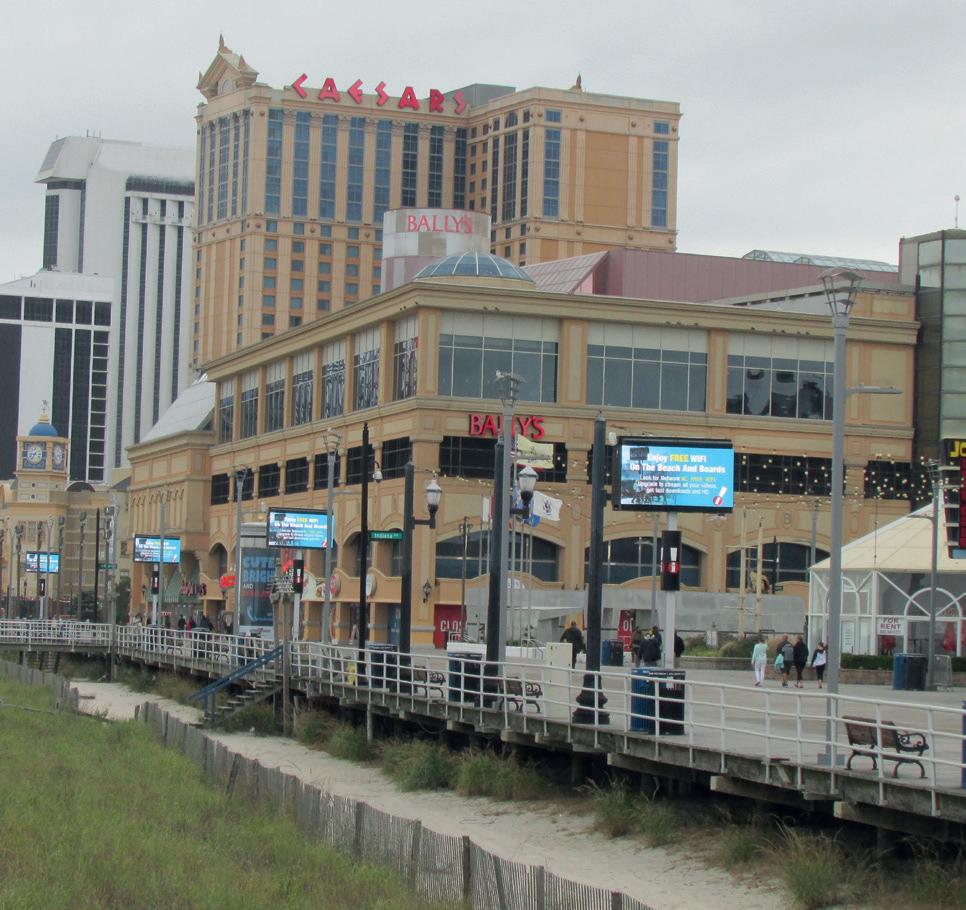
8 minute read
All Things Hospitality – COVID-19 Crisis Mode
Adapting to Change. How quickly can the damaged hospitality industry respond to a new day? By: Robert Ambrose
he book has yet to be written on the T impact of the COVID-19 virus on the casino and the entire integrated hospitality industry. When it is put to “pen,” the first few chapters will be bleak and frightening because of all the unknowns, but in the later chapters, we will read about leadership, personal strength and new beginnings. And of course, we all salute the courageous first responders and care givers that rush in and treat the sick.
A slow transition has begun as states begin to reopen their casinos and hospitality venues; to less than full capacity (required by law.) Initially, the public may choose to stay closer to their homes for a smaller local casino and dining experience, rather than to travel a distance to enter a huge resort, at least in the near future. With the proliferation of so many local casino options in the U.S., as well as with the opportunity to gamble on-line (in some jurisdictions,) options are available.
While I am on the topic, on-line gambling (in the States where legal,) helped several casino properties pay some bills during the closures. I-gaming in March was up 119% here in New Jersey. Year-to-date in the Garden State internet gaming increased 78.5 percent to $251.9 million. No surprise! Out of the shutdown may come some converts to the virtual gambling experience.
Destination hospitality environments such as Atlantic City and Las Vegas will take more effort to right size, however all local casino/entertainment locations whether small or large venues have their work ahead of them.
Then there is the customer: Educating the guests about redesigned safety enhancements, through various forms of social media, as well as on site communication methods.
Robert Ambrose Gaming Industry Veteran, Consultant, Adjunct Professor, Casino & Hospitality
And of course, offering a marketable incentive for guests to visit again, (without depleting the property budgets further,) will require, all “best-practice,” applications.
Casino operators are now creating a guest and employee environment that will keep them safe and comfortable as part of the recovery strategies; while at the same time trying not to sacrifice service quality.
Face masks, smaller casino gaming areas, with
spacing of product, entertainment and dining experiences will just be different, at least for the short term; maybe in some cases permanent.
We are seeing a strategic refocus on all public area touch points, creating a new standard on how they are approached by guest in a sanitized world.
All segments of the hospitality/casino environment have been negatively impacted and the way back, to whatever the normal will be, must be a collective effort. That means State (regulators,) city officials, health care professionals and properties working together. Restoring the resort experience is a group effort. The rolling opening, in each State and gambling jurisdiction will be gradual. And you can expect additional changes to the experience to be on-going, as this is a work in progress.
The pipeline of disposable income for travel, gambling and entertainment among the general population will not be flowing as it did in pre-virus days. We know that. The third quarter of 2020 will be transitional, reflecting minimal business levels on the accounting spread sheet. A positive fourth quarter will be something to aspire to; although I think it will still look like an open wound that is slow to heal.
As I speak with casino executives who have planned and even started to reopen properties, they recognize that with limited operations, some as low as 30% guest capacity by law, and food take out options only, the financial bleed will continue. In their year-to-year review some executives may just want to skip over 2020. “Capex” is frozen and new product purchases will be minimum to none. Many industry executives have stated we won’t see recovery norms for at least 12-18 months from initial start-up phases.
However, even though the numbers do not define a normal year, they do represent a very historical point in time. It is worth noting on how the industry raised the bar on displaying a healthier footprint for guests and employees. With those improvements will come more reliance on technology and new ways to better serve the guests.
Looking to 2021, and hopefully a virus vaccine is in place, we should begin to see some consistency in the industry numbers. There are a lot of variables in this prediction, including regional locations, continued sporadic virus out-breaks, natural events like weather, (as we are entering the hurricane season in the US,) and of course, how financially sound companies were before the pandemic. And what about those employees? I worked on the casino floor in the days of coin operated slots. It was more hands on for both player and employees. Coin dust was everywhere and hands became very dirty. The rows of slots were long and tight; the air so thick with smoke it choked. Thankfully today the HVAC systems are better than in the 80’s and smoking is limited.
Coin has been off the casino floor for some time and I am hearing from executives that maybe cash could be as well, at least in partial locations of the casino environment. The millennials long ago gave up the need for carrying cash. It is all a virtual world and debit card. Again, this is just another way to clean up the casino floor from germ laden paper cash, and just maybe a welcome amenity for the next group of customers who would prefer plastic to paper.
In this pandemic driven world of mandated “shelterin-place,” companies have relied on the internet to get things done. Could we be looking at a new format for conventions too?
Perhaps in addition to a physical presence of vendors in a large arena, the option to literally walk the convention floor and attend seminars virtually. It is already in use at ICE North America. Again, maybe short term or maybe a permanent option for those not wanting to travel or be part of a crowded environment.
Yes, there is a loss to the revenue stream, of hotels and restaurants, when people attend a conference or convention virtually; as well as a loss of in person networking opportunities. But at least in the short-term as companies try to recoup their decimated budgets, it is a great cost saving method, instead of employees attending in person.
Separate virtual sign-up packages can still be offered by the convention host, with a seminar pricing structure on the menu. Personally, I think this should have been an option years ago. It has its value.
Adapting to a crisis is built into the dynamics of the hospitality industry. Hospitality is about operating in a public space. A public environment is fluid, and “life” happens. Things don’t always go according to plan or projection.
Thankfully, the integrated resort experience has grown in product and diversification in recent years. Within the model of today’s hospitality industry there is a variety of property amenities that are a collective part of the presentation.
Separately, they each offer their brand experience and now present a unique set of their own operational challenges under the new post virus environment; whether it is dining, entertainment, retail, lodging or gambling.
Collectively they come together as one brand for the customer as the total property experience. All must confirm to related safety measure protocols.
Today, all segments of hospitality including casinos are issuing new guidelines on safety. Operations executives are collaborating with health care professionals and regulators to redesign the hospitality experience to make guests feel more comfortable and safer in “distancing,” and their interaction with all public common “touch-points” throughout the property.
Many properties are posting their new guidelines on their websites here in the States. They preface it with their company’s commitment to safety, listing the guidelines they will be following so that customers know what to expect when they visit. Some properties are also listing abbreviated hours of operation, and other property amenities that are open or closed such as: hotel, table games or spa. In most cases it is all limited as we are looking at phased opening plans. I have seen some options for properties limiting to four guests to an elevator, restaurants with disposable paper or big screen menus, and hotel check-in by smart phone.
We have already seen the changes in our supermarkets and convenience stores as dividers now separate the employee from the guest. And of course, the masks everyone wears these days places the friendly smile out of sight. The employees who are confronted daily to hours of guests moving through their property have learned an entire new meaning to the term “front-line” employee.
These fortunate employees that will be returning to work as the first wave have been through a great deal. As property leaders, it is so important to speak with them, encourage them, and communicate in a transparent way. They too have to adapt to the new environment in the workplace.
Hospitality is an industry built on people, with principals and guidelines for both customers and employees. It is housed in a business formula consisting of various regulatory requirements, a strategic operational balance, and fundamental business applications within a model of guest service.

And it’s the employees that will provide that service. They are still the face of the property, even under that face mask.
As the doors to the various hospitality venues are unlocked, the same old principles apply. Understand that every guest will visit a property once, but it’s the experience they have during the visit that will lay the ground work for their return, or not!
At this moment in time the playing field for members of the hospitality industry has been leveled. Everyone is at the “starting-gate.” Initially, with all that has happened, presenting a consistent excellent customer experience is not going to be easy as everyone becomes acquainted with a new operational paradigm.
There will be some on-going modifications as well, in floor design, spacing mandates and overall public safety applications. But over time, through perseverance and in some cases trial and error, the resilience of the hospitality industry will show through and a truly great guest experience can be created again.
The historical moments we are living will long be written about and discussed; we know many have paid a huge price. We will always remember where we were when the day the world took a pause.










